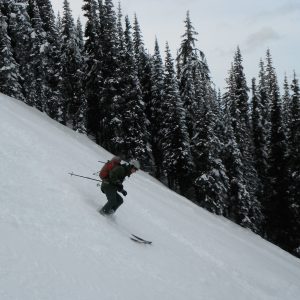
Author skiing at Apex Mountain after resort closed for season in 2017.
I like skiing. I particularly enjoy ski touring (or backcountry skiing), where I ‘earn my turns’ by climbing up the hill before skiing down. Ski touring provides a great aerobic workout. It also offers the opportunity to explore areas that are not accessible using ski lifts. Sometimes I find untouched deep powder snow that is pure joy to ski. Sometimes I deal with hard, wind packed or ice crusted snow that is no fun. Sometimes I see signs of high avalanche risk, and go back home.
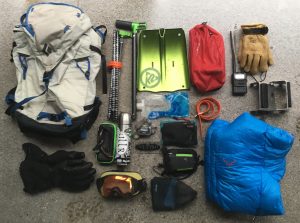
https://tizi-trekking.com/
Human powered activities, like back country skiing, snow shoeing, hiking, etc. are both healthy and low cost. Outfitting oneself with new gear is expensive. However, there is an extensive supply of used gear. Beyond the equipment, the remaining cost is transportation, both time and vehicle fuel and maintenance. Having nearby quality recreational opportunities is valuable. These quality recreation sites are also often the best sites for commercial ventures such as ski resorts.
Recently I went to Apex Mountain, to ski the back country beyond the resort. Apex was reputed to be friendly to back country skiers. I have previously climbed up through their developed terrain, sticking as close to the boundary as I could, until reaching a point where I could leave the developed terrain for the back country. Before this most recent trip, staff and ski patrol at Apex were typically friendly, often saying they wished they could join me. However, on this most recent trip, I was told I was not allowed to climb up through their terrain. Assorted justifications based on my safety were given, but the fundamental reason seemed to be that Apex was facing a lawsuit – details not provided – that had led them to take efforts to exclude public use inside their ski boundaries.
At the time of writing, Big White is applying for an extension and expansion of its tenure. The expansion plan envisions developing almost all of the terrain with the slope angles that make for enjoyable skiing that is accessible from their resort. This terrain currently offers opportunities for human propelled outdoor recreation, such as back country skiing. I have taken advantage of these opportunities, and know many other people who have as well.
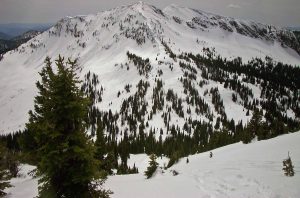
Looking south from Mount Tanner, towards terrain to be included in Powder Renegade tenure. Clear evidence of snow mobile use. http://www.granbyparkguide.ca/photogallery/Eagle-Ridge-south-of-Tanner.jpg
The Kelowna company, Powder Renegade has applied for a large crown tenure to the south and west of Granby Provincial Park, north of Grand Forks, to operate a lodge and cat ski operation. A cat ski operation uses snow cat vehicles to transport guests uphill, from where they can then ski down, to be met by a second snow cat at the end of their run. This operation will be targeted at high income clients, who will be shuttled to the resort by helicopter from Kelowna International Airport. I have hiked in this area, and friends have ski toured in the area.
These businesses must have a tenure arrangement with the provincial government to allow their operations. Tenure arrangements are agreements negotiated between the government and the tenure holder, specifying what activities the holder can conduct on the land, and what activities the tenure holder can exclude others from undertaking on that land. Crown tenures are essentially partial privatizations of formerly public lands. The land technically remains crown land, but the crown has given up some of its rights on that land. An exclusive tenure permits the tenure holder to exclude the public from use of the land, which is not much different from private property. In exchange, the crown collects fees and rent from the tenure holder. Application details available at Front Counter BC.
This process of arranging tenure, and of selling crown land as private property, is known as ‘disposal’ of crown land. It reflects the historic attitude that land is essentially worthless if it is not put to productive use of some kind by private citizens. This land was far from worthless to the people who were living here when the crown decided it had the authority to dispose of it. Treating it as a disposal of something worthless is also consistent with the way that government can treat revenues from sales and tenure arrangements, as income rather than as the sale of a valuable asset. This ignores the fact that these lands provide a wealth of services to the public, services which may continue to be provided when the land is disposed of. However, once under private control, services the public formerly could enjoy at no cost now they are often asked to pay for or forbidden from enjoying.
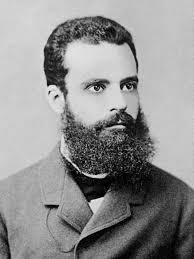 Vilfredo Pareto is credited with describing economic efficiency, commonly called Pareto efficiency. If a situation is Pareto efficient, then there is no alternative situation possible that would leave at least one person better off and not leave anyone worse off. Pareto efficiency is the underlying normative criteria in most economic analyses. Broadly speaking, economists look for Pareto improvements, situations where it is possible to make someone better off without making anyone else worse off, and make these known to decision makers.
Vilfredo Pareto is credited with describing economic efficiency, commonly called Pareto efficiency. If a situation is Pareto efficient, then there is no alternative situation possible that would leave at least one person better off and not leave anyone worse off. Pareto efficiency is the underlying normative criteria in most economic analyses. Broadly speaking, economists look for Pareto improvements, situations where it is possible to make someone better off without making anyone else worse off, and make these known to decision makers.
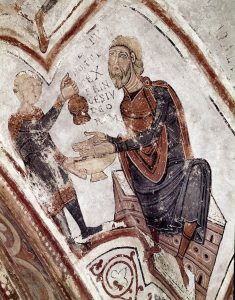 Unfortunately, making sure nobody is made worse off requires understanding how everyone is affected by a decision, and providing them with appropriate compensation to offset any negative impacts. Like Pontius Pilot, many economists ‘wash their hands’ of this tricky problem. In the biblical writings, Pontius Pilot was the Roman governor over the territory that now includes Israel. He sat in judgement of Jesus Christ, who the local religious elite wanted sentenced to death. He decided that there was no grounds to sentence Jesus to death. However, he was fearful of the elites, and handed Jesus over to them to be crucified, pointedly washing his hands of responsibility for Jesus fate.
Unfortunately, making sure nobody is made worse off requires understanding how everyone is affected by a decision, and providing them with appropriate compensation to offset any negative impacts. Like Pontius Pilot, many economists ‘wash their hands’ of this tricky problem. In the biblical writings, Pontius Pilot was the Roman governor over the territory that now includes Israel. He sat in judgement of Jesus Christ, who the local religious elite wanted sentenced to death. He decided that there was no grounds to sentence Jesus to death. However, he was fearful of the elites, and handed Jesus over to them to be crucified, pointedly washing his hands of responsibility for Jesus fate.
Economists speak of ‘Potential Pareto Improvements’, situations where those who benefit from a decision gain enough that they could compensate those who are adversely affected. Many economists ‘wash their hands’ of ensuring that nobody is made worse off by passing the responsibility for deciding how to divide the gains to the politicians. Thereby, these economists take no responsibility for whether those who are made worse off are actually compensated. However, there are some economists who argue that the political process cannot be trusted to ensure that adverse effects are compensated. They argue that projects and policy changes should include measures to ensure that nobody is left worse off.
Are restricting public access to the terrain used by Apex for its resort operations, expanding and extending Big White’s tenure, or granting an adventure tourism tenure to Power Renegade, potential Pareto improvements? Are the gains – profit to the operator, revenues to the government, etc. – sufficient to compensate those who loose out – including human powered recreators. We don’t know, because we don’t have a good measure of how much worse off these users are. What is a back country ski day near Big White worth to the skier? How much would their costs go up if they have to travel elsewhere? How much will their enjoyment be reduced because of congestion at these other places? We don’t know. If we can’t trust the political process to ensure that those who are harmed are compensated, and we don’t even know the size of the harm, then it seems we should do all we can to ensure that harm does not occur.
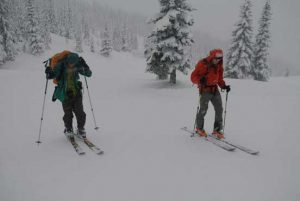
Blog post of trip through Manning Park Ski Resort. https://stevensong.com/coastal-interior-bc/bc-cascades/grassy-mountain/
Arguing that public access needs to be restricted to ensure public safety is questionable. The Poland Lake Trail in Manning Provincial Park passes through the ski hill. As a youth in the 80’s, I first saw back country skiers in Manning Park as they made their way up through the ski hill, and some of them making graceful telemark turns on a slope visible from the lift. Big White has pedestrians travelling along a walking path between the Snow Pine Estates development and the main village that crosses ski runs. Many people who do not have a ski pass use this path, walk dogs along it, and some cross country ski or snow shoe to access the trail network east of the village. Silver Star Resort has an extensive network of cross country trails, with part of that network crossing downhill ski trails. Risks created by having people on the resort who are not downhill skiers is clearly manageable. The Poland Lake Trail and Big White’s walking path, both used by people who have not purchased passes from the resort, shows that the liability risk is also manageable.

https://vernoncommunications.ca/radio-solutions/2-way-radios/
Many people do ski tour in areas accessed from forest service roads. Some of these roads are also used for logging. Signs are posted indicating that active logging is ongoing. The radio frequency being used to call locations when traveling along these roads is also provided on signs. The roads are not closed to public use, and the risk of injury and death from an unexpected encounter with a logging truck is at least as serious as being struck by a downhill skier.
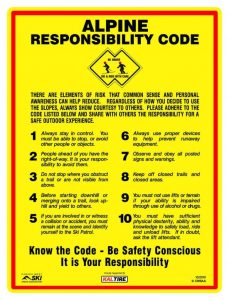 Should Apex be able to restrict public access in the name of public safety? Or should it be required as part of the terms of its tenure to take all reasonable measures to protect the public that uses its tenure? The ski patrol described the hazards to me as being hit by out of control skiers and being injured or killed by avalanche control measures. Clear signage describing these hazards together with warnings about location and timing of avalanche control measures would seem sufficient. Should Apex be able to restrict public access to reduce its risk of being sued? No. If Apex is undertaking its responsibilities to protect the public using its tenure, all should be fine. If it isn’t, then a lawsuit is an appropriate tool for someone harmed by Apex’ negligence. Manning Park Resort and Big White Resort both manage these liability risks without the need to ban people without a pass from their terrain.
Should Apex be able to restrict public access in the name of public safety? Or should it be required as part of the terms of its tenure to take all reasonable measures to protect the public that uses its tenure? The ski patrol described the hazards to me as being hit by out of control skiers and being injured or killed by avalanche control measures. Clear signage describing these hazards together with warnings about location and timing of avalanche control measures would seem sufficient. Should Apex be able to restrict public access to reduce its risk of being sued? No. If Apex is undertaking its responsibilities to protect the public using its tenure, all should be fine. If it isn’t, then a lawsuit is an appropriate tool for someone harmed by Apex’ negligence. Manning Park Resort and Big White Resort both manage these liability risks without the need to ban people without a pass from their terrain.
Should Big White receive an expanded tenure ignoring the current users of the area it seeks to expand into? Providing clear signage describing the hazards and designated and practical routes whereby current users can continue to use the area would seem to ensure, as far as possible, current users are not made worse off. Charging to snow shoe or ski tour within this tenure, on account of the cost of improvements that these recreators had no need of, seems like a form of exclusion, and is therefore questionable as part of leaving current users no worse off. The Big White Master Plan does seek to accommodate snow mobile users, but does not include other users. Snow mobile users are well organized and well supported, unlike the human powered recreators, and they are able to effectively travel to more remote areas to recreate than those traveling under their own energies.
The Powder Renegades tenure proposal envisions no conflict between their operations and current users. Whether this remains the case is yet to be seen. There is a growing demand for backcountry recreational opportunities, making it likely that increasing numbers of snow mobile riders and ski tourers will be seeking to use the land that Powder Renegades will operate in. This is particularly likely if Big White is able to exclude such public uses, which will divert some people to the west Granby area. How will this be accommodated when it occurs?
British Columbians often take pride in knowing that a large share of the province is crown land. What many provincial residents may not realize is that an ever increasing share of this crown land is partially privatized through tenure arrangements. As of this writing, there are 764 applications for some form of tenured use on crown land (see https://comment.nrs.gov.bc.ca/applications). For some activities, particularly human powered recreational activities, the best locations for these activities are also the best locations for commercial operations, commercial operations that may seek to limit public use. Absent clear compensation for the impacted users, these restrictions to public access and use should, I believe, only be permitted where there is no clear way for the tenure holder to adequately protect the public from the consequences of the activities permitted by their tenure. These restrictions should be limited to those times and locations where operations by the tenure holder present a clear risk.
Was Vilfredo Pareto a skier? He lived in Lausanne, Switzerland, teaching at the University of Lausanne. He lived there from 1893 till he passed away in 1923. Organized skiing began in Switzerland in 1893. Perhaps he was a skier. He would certainly appreciate the practical challenges of ensuring these tenure changes do not lead to anyone being made worse off.
Epilog: My submission in response to Big White’s expansion proposal: BigWhiteMasterPlan_response_Janmaat_V2

 Follow
Follow